Seven companies have been selected following the analysis of bids from bidders in response to the international expression of interest (EOI) issued on April 30, 2025 for the construction of ultrafiltration and bottling lines for table water at Cameroon Water Utilities (Camwater). The announcement was made in a press release issued on July 11, 2025 by the General Manager of the water concessionaire in Cameroon, Blaise Moussa.
According to evaluation criteria set out in this EOI, the pre-qualified companies, ranked in order of merit, received scores ranging from 92 to 75 out of 100. The companies and business groups are: Batratel, Jiangsu Mesure Machinery Co Ltd, Trbex Impex PVT Ltd, Sipa SpA, Loumos Group LLC, Zhangjiagang Baiji Machienry/Light Logistics Services, and Beier Machinery. These entities, as stated in the Camwater press release, are the only ones “qualified for the subsequent restricted international tender.”
Camwater plans to build five ultrafiltration and bottling units for table water in the cities of Douala, Yaoundé, Bafoussam, Limbé, and Maroua. The public water concessionaire in Cameroon states that “the pre-qualified companies will be evaluated based on the production of a market study, architectural and technical design, as well as the supply, installation, and commissioning of complete bottling lines in 10-liter, 1.5-liter (6-bottle packs), and 0.5-liter (12-bottle packs) formats.” The work, to be completed within 24 months, will be financed by the State, Camwater, or through public-private partnerships (PPP). “The nature of the contract will depend on the size of the envisaged units and the profile of the proposed partners,” the State-owned company officially reports. Camwater’s entry into the bottled water market comes at a time when this sector is dominated by the Lebanese company Source du Pays, which has controlled the local market for nearly a decade with 58% market share, ahead of Société des eaux minérales du Cameroun (SEMC), a subsidiary of the French group Castel.
As a reminder, according to a national survey conducted in 2021 by the National Institute of Statistics (INS), “only 29% of Cameroonian households have access to the public water distribution network. […] 40% of households mainly rely on boreholes and pump wells, followed by protected wells (17%), unprotected wells (14%), and protected sources (10%).”
In its Vision 2025, the Cameroonian government aims to increase access to potable water to 75%, and then to 100% in urban areas and 85% in rural areas by 2030 in the National Development Strategy 2020-2030 (SND30).


